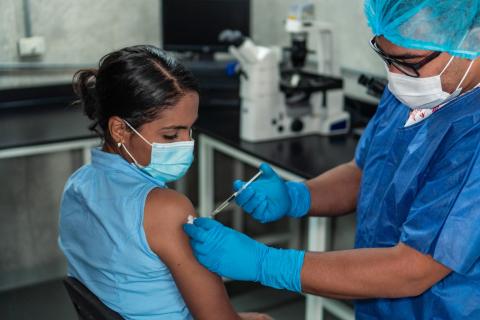"First, do not harm": The case for Monitoring the Safety & Effectiveness of COVID-19 Vaccines and Vaccination

This blog was originally posted at the World Bank Group's Investing in Health site under the title "Monitoring the Safety & Effectiveness of COVID-19 Vaccines and Vaccination" on June 9, 2021: https://blogs.worldbank.org/health/monitoring-safety-effectiveness-covid-19-vaccines-and-vaccination?CID=WBW_AL_BlogNotification_EN_EXT
Huihui Wang, Albert Figueras & Patricio V. Marquez
As the world continues to face the public health, social, and economic unravelling from SARS-CoV-2, the coronavirus that causes COVID-19 disease, it should be clear to us that to overcome the pandemic, a large share of the world needs to be immune to the virus. The World Bank Group is helping developing countries purchase and distribute vaccines and strengthen health systems through a $12 billion vaccine financing facility, which complements the $6 billion Global COVID-19 Strategic Preparedness and Response Program in the health sector approved in April 2020 and that now covers more than 110 countries.
While mounting evidence suggests COVID-19 vaccines do reduce transmission, the global vaccination effort is highly inequitable. In fact, as many in the developing world wait for their first dose of vaccine, many wealthier countries are now discussing booster programs for their people. As of the beginning of June 2021, only about 11% of the world’s population, or around 852 million people, have received at least one dose of one of the COVID-19 vaccines.
These numbers show that the key global challenge nowadays is to make these vaccines available to all people around the world on the basis of a “new commitment for vaccine equity”. Equally important is to ensure that the focus on vaccines is accompanied by a well-designed, funded, and implemented vaccination effort. Both are two faces of the same coin, as one complements the other.
As past vaccination efforts have showed us, governments need to strengthen some key core activity areas to help translate the promise of vaccines into active immunization--the process by which an individual's immune system becomes fortified against an agent so that the body can learn to protect itself. These activities range from planning and management, supply and distribution of vaccines, program delivery, to supporting systems and infrastructure, in accordance with country-specific context and epidemic status. In coordination with the Global Fund, WHO, and UNICEF, the World Bank has supported 140 countries to conduct assessments to identify their readiness for vaccines rollouts.
Monitoring the safety and effectiveness of vaccines is critical
As discussed in recent learning event organized by the World Bank, vaccine safety is very important as countries campaign for immunization. Vaccines must be stored at correct temperatures and safely handled to ensure full potency. There may be risks of vaccine derived SARS-CoV-2 infection and vaccine enhanced disease. At some point, the available vaccines might have less efficacy in front of certain SARS-CoV2 variants, thus leading to vaccine ineffectiveness (or apparent resistance to vaccines).
The monitoring of vaccine coverage, effectiveness, and safety is a vital tool to ensure comprehensive and effective vaccination. Surveillance, which includes pharmacovigilance, has been one of the criteria of country readiness assessments. Of the countries assessed, 68% reported that they have surveillance systems in place, but their quality varies significantly.
Currently, as COVID-19 immunization campaigns are being rolled out in more and more countries, different monitoring programs are starting to collect reports of suspected adverse effects of these vaccines. To help countries strengthen their pharmacovigilance programs and harmonize the data collection process, the World Health Organization (WHO) has generated different documents, toolkits, and training materials such as the COVID-19 vaccine introduction toolkit and the Comprehensive Covid-19 vaccines: safety surveillance manual.
The safety of the vaccination process also matters
The main interest of monitoring activities should be the generation of knowledge about the safety of the individuals receiving a COVID-19 vaccine, taking into account the different actions, actors, and situations involved in immunization campaigns covering different population groups, geographical regions, and diverse healthcare systems.
Indeed, adverse events following immunization (AEFIs) can happen due to vaccination risks such as:
- underdosing
- replacing one vaccine brand with another which is deemed to be less desirable by the population
- replacing the vaccine with a non-vaccine product
- revaccination with different COVID-19 vaccines
- when the product supply chain is interrupted, the cold chain is broken, and the quality of the inoculated vaccine is low, and/or the vaccination is done with expired vaccines
- inappropriate inoculation techniques and safety protocols at the facility level.
Towards a comprehensive surveillance of the events associated with COVID-19 vaccination
Pharmacovigilance or post-vaccination surveillance needs serious attention from policy makers and program managers given the risk of adverse vaccine and vaccination events. This is important because the knowledge about a vaccine’s efficacy and safety is not complete as the exposed population is limited to those in the clinical trials.
In the case of COVID-19 vaccines, which are being administered to such a wide population, a continuous vigil on its application is obligatory during the post-vaccination period to identify and assess any reported adverse events and, above all, adverse events of special interest.
Robust monitoring and assessment of adverse events are also vital to inform public communication activities that are needed to build vaccine confidence—if governments reliably and regularly communicate what is happening and are consistent with messages on the basis of evidence. Unfortunately, this has not always been the case, which has made some communities suspicious about the vaccination programs.
Tracking unwanted effects of vaccines and their administration
While countries are increasing their preparedness to monitor any adverse contingency potentially related to COVID-19 vaccines and their administration, it is a good time to remember that:
- Monitoring vaccine safety is much more than just looking at the vaccine per se.
- Vaccines can interact with concomitant medications being taken by the individuals.
- The response of everyone can be modified by concurrent conditions (either chronic, such as hypertension or diabetes, or acute, such as other infections).
- Inappropriate vaccination process may increase chances for AEFI to appear.
- The reference dictionaries used in pharmacovigilance (e.g., MedDRA) are versatile and include many terms which can help to code AEFIs, reflecting problems associated with the vaccination process (for example, “social circumstances”, “missing dose”) or any other facility-level risks. Also, “vaccine ineffectiveness” is an existing term.
These considerations highlight the importance of monitoring not only the safety and effectiveness of vaccines, but also the tracking of vaccination safety. By doing this, policy makers and program managers will gain a wider knowledge of the impact of unwanted effects associated both with COVID-19 vaccines, but also their administration.
That knowledge could be the basis for the early identification of problems and the design of specific interventions to avoid preventable adverse outcomes that could harm the population and undermine the trust in the vaccination effort, further delaying the economic and social recovery of countries.
In supporting countries to strengthen their pharmacovigilance efforts we will help realize the basic tenet of the millennia-old Hippocratic Oath, “First, do no harm,” which is at the core of public health and medical practice.
